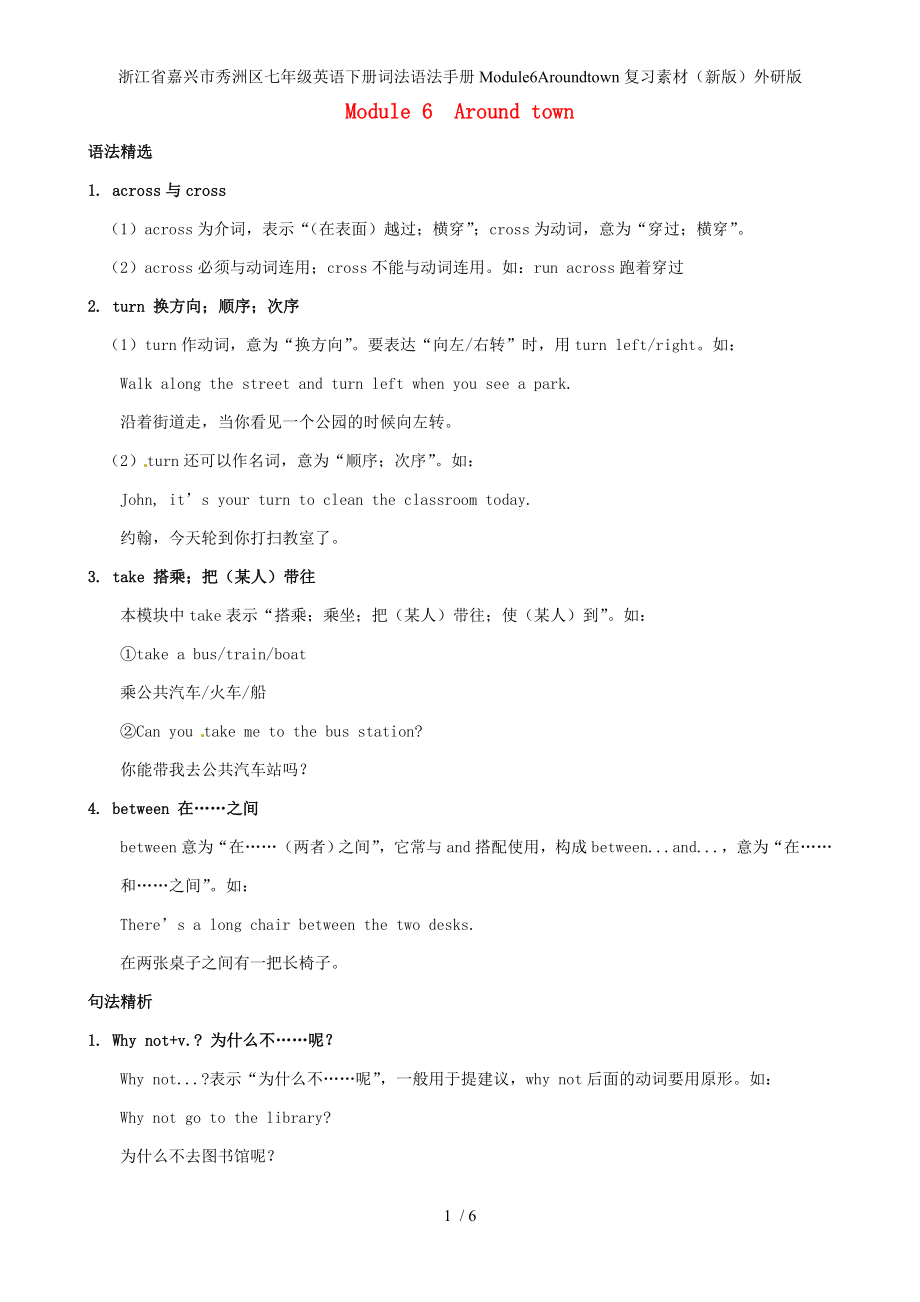《浙江省嘉興市秀洲區(qū)七年級(jí)英語(yǔ)下冊(cè)詞法語(yǔ)法手冊(cè)Module6Aroundtown復(fù)習(xí)素材(新版)外研版》由會(huì)員分享�,可在線閱讀��,更多相關(guān)《浙江省嘉興市秀洲區(qū)七年級(jí)英語(yǔ)下冊(cè)詞法語(yǔ)法手冊(cè)Module6Aroundtown復(fù)習(xí)素材(新版)外研版(6頁(yè)珍藏版)》請(qǐng)?jiān)谘b配圖網(wǎng)上搜索。
1��、浙江省嘉興市秀洲區(qū)七年級(jí)英語(yǔ)下冊(cè)詞法語(yǔ)法手冊(cè)Module6Aroundtown復(fù)習(xí)素材(新版)外研版
Module 6 Around town
語(yǔ)法精選
1. across與cross
(1)across為介詞�,表示“(在表面)越過(guò);橫穿”���;cross為動(dòng)詞�����,意為“穿過(guò)���;橫穿”。
(2)across必須與動(dòng)詞連用����;cross不能與動(dòng)詞連用。如:run across跑著穿過(guò)
2. turn 換方向�;順序;次序
(1)turn作動(dòng)詞���,意為“換方向”�。要表達(dá)“向左/右轉(zhuǎn)”時(shí),用turn left/right�。如:
Walk along the street and turn lef
2、t when you see a park.
沿著街道走���,當(dāng)你看見一個(gè)公園的時(shí)候向左轉(zhuǎn)��。
(2)turn還可以作名詞����,意為“順序��;次序”���。如:
John, it’s your turn to clean the classroom today.
約翰��,今天輪到你打掃教室了��。
3. take 搭乘�����;把(某人)帶往
本模塊中take表示“搭乘���;乘坐����;把(某人)帶往��;使(某人)到”���。如:
①take a bus/train/boat
乘公共汽車/火車/船
②Can you take me to the bus station?
你能帶我去公共汽車站嗎?
4. between 在
3����、……之間
between意為“在……(兩者)之間”,它常與and搭配使用��,構(gòu)成between...and...���,意為“在……和……之間”�。如:
There’s a long chair between the two desks.
在兩張桌子之間有一把長(zhǎng)椅子����。
句法精析
1. Why not+v.? 為什么不……呢?
Why not...?表示“為什么不……呢”��,一般用于提建議��,why not后面的動(dòng)詞要用原形。如:
Why not go to the library?
為什么不去圖書館呢�?
類似的表達(dá)法還有:Why don’t you+v.?, What/How abou
4���、t+v.?鄄ing?����, Let’s+v.�。
2. Could you tell me how to get to+地點(diǎn)?
=Can you tell me the way to+地點(diǎn)?
=Where is+地點(diǎn)?
以上三個(gè)例句都是問(wèn)路的常用句型。the way to意為“去……的路”�,后面常接表示地點(diǎn)的名詞。如果to后面接地點(diǎn)副詞(如:here, there, home)時(shí)��,則省略to��。如:
We don’t know the way to the airport.
我們不知道去機(jī)場(chǎng)的路�。
3. As you go along the river, the London Eye
5、is on your right.
當(dāng)你沿河行進(jìn)時(shí)��,倫敦眼在你的右邊��。
這個(gè)句子中的as作連詞����,意為“當(dāng)……的時(shí)候”�,引導(dǎo)一個(gè)時(shí)間狀語(yǔ)從句�,表示主句和從句的動(dòng)作同時(shí)進(jìn)行。如:
The beautiful girls are singing as they are dancing at the party.
這些漂亮的女孩在派對(duì)上邊唱邊跳��。
語(yǔ)法精講
方位的表達(dá)方式
1. 方位介詞
on the left/right在左邊/右邊
next to... 臨近……
opposite... 在……的對(duì)面
on the corner of... 在……的拐角
between...
6����、and... 在……和……之間
2. 問(wèn)路的句型
Where is...?
How can I go/get to...?
Excuse me. Can you tell me the way to...?
Could you show me the way to...?
3. 指路的句型
Go along the street and you’ll see...
Turn left/right.
Turn left into...
Take the underground/a bus/a taxi.
Follow the road...
試題精編
一、用所給詞的適當(dāng)
7����、形式填空
1. Could you tell me how (buy) things on the Internet?
2. Why not (take) a taxi there?
3. My son likes (paint) very much.
4. Thousands of (tour) go to visit the famous lake every year.
5. It will take you twenty minutes (get) to the Lond
8�、on Eye.
6. This is a famous museum with lots of (painting).
7. Can you tell me how (get) there?
8. Why not (ask) the policeman?
9. In my city, there are three (church).
10. It takes you 135 (metre) above the River Thames.
二��、用方框中所給單詞的適當(dāng)形式填空
9���、
across could three paint finish above past from turn underground
1. Walk the post office and you’ll see the library.
2. She likes and wants to be a painter.
3. I can’t the work. Please give me two more days.
4. The plane is flying the clouds
10����、.
5. It is ten kilometres my home to my school.
6. You can take the to go there.
7. Go the street and you’ll see the library on your right.
8. you please show me the way to the nearest supermarket?
9. My room is on the floor.
10.
11���、 right and you’ll find the bookshop.
三��、句型轉(zhuǎn)換
1. Jodie is on my left. Nancy is on my right. (合并為一句)
I’m Jodie Nancy.
2. The restaurant with a beautiful garden is on Happy Road. (對(duì)畫線部分提問(wèn))
the restaurant with a beautiful garden?
3. His house is behi
12�����、nd our school. (改為同義句)
Our school is his house.
4. —Are there two clothes shops on Park Street? (作否定回答)
— , .
5. Could you tell me how to get to the restaurant? (改為同義句)
Could you tell me
13�����、 the restaurant?
四�����、根據(jù)漢語(yǔ)意思翻譯句子
1. 打擾了�!請(qǐng)問(wèn)到王府井大街怎么走?
!Can you tell me Wangfujing Dajie?
2. 穿過(guò)東長(zhǎng)安街�,沿著這條街走,然后在左邊的第三條街左拐��。
Dong Chang’an Jie, the street and turn left at the third street
14����、
3. 這兒附近有書店嗎?
a bookshop near here?
4. 我怎樣到那里呢����?
I get there?
5. 為什么不問(wèn)一下那邊的那位老人呢���?
ask the old man over there?
6. 祝你度過(guò)美好的一天!
!
五�����、語(yǔ)法填空
15�、閱讀下面短文,按照句子結(jié)構(gòu)的語(yǔ)法性和上下文連貫的要求���,在空格處填入一個(gè)適當(dāng)?shù)脑~或使用括號(hào)中詞語(yǔ)的正確形式填空(每空不多于2個(gè)單詞)�。
Sam is a twelve-year-old boy. He goes out of the train station. He 1 (not) know the way to People’s Hotel 2 he is new in town. He sees a policeman. He 3 (run) to him and asks, “Excuse me. 4 is P
16�����、eople’s Hotel?”
“Oh, it’s not far from here. Walk along the street and turn right at the 5 (three) crossing. There is a clothes shop on your left and a park on your 6 . Walk on 7 you can see a restaurant.
The hotel is just next 8 the restaurant.”“And 9
17�、 does it take to walk there?” “About 15 minutes,” says the policeman. Now, Sam knows 10 way, and he’s very happy. He thanks the policeman and leaves the train station.
參 考 答 案
Module 6
一��、1. to buy 2. take 3. paintings/painting 4.tourists 5. to get
18�、
6. paintings 7. to get 8. ask 9. churches 10. metres
二、1. past 2. painting 3. finish 4. above 5.from
6. underground 7. across 8. Could 9. third 10. Turn
三�、1. between, and 2. Where is 3. in fro
19、nt of 4. No, there aren’t 5. the way to
四、1. Excuse me, the way to 2. Go across, go along, on the left 3. Is there
4. How can 5. Why not 6. Have a nice day
五�����、1. doesn’t 2. because 3. runs 4. Where 5.third
6. right 7. and 8. to 9. how long 10. the
6 / 6
 浙江省嘉興市秀洲區(qū)七年級(jí)英語(yǔ)下冊(cè)詞法語(yǔ)法手冊(cè)Module6Aroundtown復(fù)習(xí)素材(新版)外研版
浙江省嘉興市秀洲區(qū)七年級(jí)英語(yǔ)下冊(cè)詞法語(yǔ)法手冊(cè)Module6Aroundtown復(fù)習(xí)素材(新版)外研版

